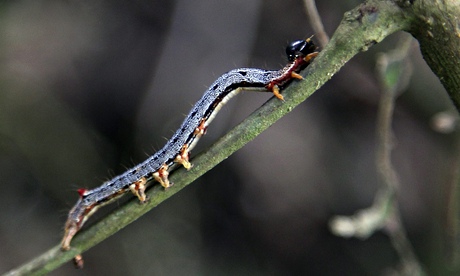Liberia caterpillar plague causes mass evacuation and crop destruction
Thousand flee homes in at least 25 towns and villages in Lofa and Gbarpolu, the second such invasion in five years

One of millions of caterpillars moves through crops iin farms in Gbarpolu county, Liberia. Photograph: Ahmed Jallanzo/EPA
A plague of caterpillars has forced thousands of people to flee their homes in northern Liberia, as well destroying crops, contaminating water and forcing schools to close.
Residents of at least 25 villages and towns in Lofa and Gbarpolu counties have joined a mass exodus so far this month to escape the trail of caterpillar excrement, according to the Voice of America (VOA).
It is the second such invasion in five years. A state of emergency was declared in 2009 after tens of millions of caterpillars swept through at least 80 towns and villages in the centre and north of the country.
Dr Sizi Subah, deputy agriculture minister for technical services, told Liberia's The Inquirer that the caterpillars, which travel in huge numbers, have the capacity to destroy large areas since they feed on the leaves of cash crops such as coffee, cocoa and vegetables during the larva stage before developing into butterflies.
Subah linked the latest infestation to "climate change", the Inquirer reported.
The huge volume of excrement dropped by the caterpillars has contaminated wells and other fresh water sources, rendering them undrinkable. The pests have also colonised classrooms, forcing many schools in the area to shut down.
Jeremiah Toe, a nurse in one of the affected villages, told the VoA that the caterpillars pose a serious threat to public health. "The situation is alarming," he was quoted as saying. "We have informed the ministry of health. As you can see, the caterpillars are taking over the homes of residents. They have polluted the creeks. Even our clinic has been attacked by the caterpillars."
Smaller invasions of caterpillars occurred in 2011 and 2012. Winfred Hammond, a senior entomologist at the UN Food and Agriculture Organisation, told the VOA: "The biggest concern is the fact that this is becoming a regular occurrence. It's about time we seriously consider putting in place early warning systems and look at how we can contain or check this problem from becoming a big national concern. To prevent it as we've seen, you need to have a good surveillance system in place."
Liberian officials said they have begun spraying pesticides in a bid to control the plague.
Residents of at least 25 villages and towns in Lofa and Gbarpolu counties have joined a mass exodus so far this month to escape the trail of caterpillar excrement, according to the Voice of America (VOA).
It is the second such invasion in five years. A state of emergency was declared in 2009 after tens of millions of caterpillars swept through at least 80 towns and villages in the centre and north of the country.
Dr Sizi Subah, deputy agriculture minister for technical services, told Liberia's The Inquirer that the caterpillars, which travel in huge numbers, have the capacity to destroy large areas since they feed on the leaves of cash crops such as coffee, cocoa and vegetables during the larva stage before developing into butterflies.
Subah linked the latest infestation to "climate change", the Inquirer reported.
The huge volume of excrement dropped by the caterpillars has contaminated wells and other fresh water sources, rendering them undrinkable. The pests have also colonised classrooms, forcing many schools in the area to shut down.
Jeremiah Toe, a nurse in one of the affected villages, told the VoA that the caterpillars pose a serious threat to public health. "The situation is alarming," he was quoted as saying. "We have informed the ministry of health. As you can see, the caterpillars are taking over the homes of residents. They have polluted the creeks. Even our clinic has been attacked by the caterpillars."
Smaller invasions of caterpillars occurred in 2011 and 2012. Winfred Hammond, a senior entomologist at the UN Food and Agriculture Organisation, told the VOA: "The biggest concern is the fact that this is becoming a regular occurrence. It's about time we seriously consider putting in place early warning systems and look at how we can contain or check this problem from becoming a big national concern. To prevent it as we've seen, you need to have a good surveillance system in place."
Liberian officials said they have begun spraying pesticides in a bid to control the plague.
No comments:
Post a Comment